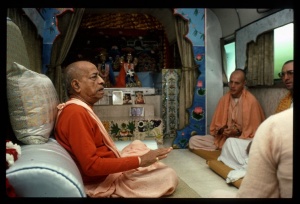CC Adi 5.76

A.C. Bhaktivedanta Swami Prabhupada
TEXT 76
garbhoda-kṣīroda-śāyī doṅhe ‘puruṣa’ nāma
sei dui, yāṅra aṁśa,—viṣṇu, viśva-dhāma
SYNONYMS
garbha-uda—in the ocean known as Garbhodaka within the universe; kṣīra-uda-śāyī—one who lies in the ocean of milk; doṅhe—both of Them; puruṣa nāma—known as puruṣa, Lord Viṣṇu; sei—those; dui—two; yāṅra aṁśa—whose plenary portions; viṣṇu viśva-dhāma—Lord Viṣṇu, the abode of the total universes.
TRANSLATION
Garbhodaśāyī and Kṣīrodaśāyī are both called puruṣas. They are plenary portions of Kāraṇodaśāyī Viṣṇu, the first puruṣa, who is the abode of all the universes.
PURPORT
The symptoms of the puruṣa are described in the Laghu-bhāgavatāmṛta. While describing the incarnations of the Supreme Personality of Godhead, the author has quoted from the Viṣṇu Purāṇa (6.8.59), where it is said, “Let me offer my respectful obeisances unto Puruṣottama, Lord Kṛṣṇa, who is always free from the contamination of the six material dualities; whose plenary expansion, Mahā-Viṣṇu, glances over matter to create the cosmic manifestation; who expands Himself in various transcendental forms, all of which are one and the same; who is the master of all living entities; who is always free and liberated from the contamination of material energy; and who, when He appears in this material world, seems one of us, although He has an eternally spiritual, blissful, transcendental form.” In summarizing this statement, Rūpa Gosvāmī has concluded that the plenary expansion of the Supreme Personality of Godhead who acts in cooperation with the material energy is called the puruṣa.